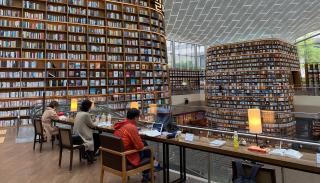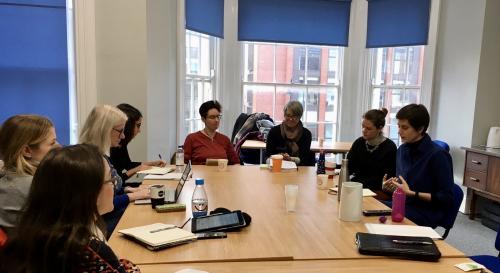
Breadcrumbs navigation
The emergence and evolution of International Relations studies in postcolonial South Korea
Jungmin Seo & Young Chul Cho discuss the key points from their new article in BISA journal Review of International Studies (RIS). Their study investigates how International Relations (IR) as an academic discipline emerged and evolved in South Korea, focusing on the country's peculiar colonial and postcolonial experiences. In the process, it examines why South Korean IR has been so state-centric and positivist (American-centric), while also disclosing the ways in which international history has shaped the current state of IR in South Korea, institutionally and intellectually.
South Korea is a postcolonial country. Nevertheless, post/decolonial research has been scant in the local IR studies until now. Instead, IR studies in South Korea has been a representation of American rationalist IR. Inspired by the spirit of decolonial thinkers, such as Frantz Fanon and Kuan-Hsing Chen, we critically investigate how international relations (IR), as an academic discipline, emerged and evolved in South Korea, with focus on its peculiar colonial and post-colonial experiences.
In terms of IR theory debate, we develop ideas that are important for Koreans, Asians, and post-colonial readers of IR because using South Korean IR experiences in Asia as a reference point, according to Kuan-Hsing Chen, ‘might be able to offer a new view of global history, and to pose a different set of questions’. We thus attempt to uncover a range of alternative stories that need to be heard, which is in line with the project of worlding IR.
We also raise pragmatic concerns that would be of interest to IR students aiming to develop more critical strands of IR studies in and from institutional surroundings inhospitable to postpositivist and decolonial IR research as they have been developed in Western contexts. In addition, by exploring the post-colonial case of IR studies in South Korea, we may contribute to the recent diversifying IR movement that searches for difference and equality in a still homogenous, hegemonic IR discipline.
Key arguments
We argue that IR intellectuals in South Korea have largely reflected the political arrangement of their time (e.g. the peculiar nature of non-Western Japanese imperialism/colonialism, the Cold War just after the Korean War, democratisation, neoliberal globalisation, etc.), rather than demonstrating academic independence or leadership for its government and/or civil society as they have navigated difficult power structures in world politics.
Twisted post-coloniality in (South) Korea after Non-Western Japanese Imperialism
Regarding the trajectory of South Korean IR studies, although there are many contexts and milieus to examine, Korean colonial experiences are arguably the most critical element that influenced the birth of IR studies in South Korea. For Korea, like any other former colony, (Japanese) colonialism was a deeply humiliating experience. This painful experience made Korean colonial and post-colonial intellectuals rethink about themselves, their country, and the international environment. The first thing that they realised was that Westphalian international politics - not civilisational politics based on Confucian Sino-centric tributary system - mattered. Second, against Japanese imperialism/colonialism, nationalism and state-building became ever more important than other values in Korea. Academically, statism was central to the local intellectuals’ epistemological, ontological, and ethical underpinnings of conducting IR studies in South Korea.
Lastly, the Japanese colonial state in Korea was hegemonic, yet unable to monopolise the regime of truth in the colonial society because of the peculiar nature of ‘non-Western’ Japanese imperialism. Japan had to distinguish itself from Western imperialism for its own peculiar identity while insisting that Japan’s moral superiority had a universal value that other Asian people should follow and learn. Yet, the weak status of the Japanese empire vis-à-vis Western imperial powers in real world politics and the relative lack of universality of Japanese imperial discourse allowed its colonial subjects, especially Korean intellectuals, to seek alternative, and presumably better, sources of modernity such as Christianity and Western knowledge.
Importing and mimicking Western modernity was imperative for post/colonial Korean intellectuals with regard to their country’s coming into being in the Westphalian system. The West was more than welcome - for Korea to resist the non-Western imperial Japan: to expel the ‘Other’ (the coloniser, Japan), the ‘Self’ (the colonised, Korea) needed and used a different hegemonic tool of ‘Another’ (Western modernity). This is the result of the above-mentioned peculiar nature of Japanese imperialism. In other words, what makes the postcoloniality of South Korea different from other post-colonial countries worldwide is the absence - or weakness - of colonial legacies in knowledge production and systems in IR studies and beyond. In South Korea’s case, this is like twisted post-coloniality in IR.
A Western/American future while discontinuing its traditional and colonial past
Since Korea’s liberation in 1945, America, a guardian of South Korea’s national security against the communist bloc, had been the knowledge epicentre and dream land where South Korean students were eager to go and study. From the early 1960s, Korean academia witnessed a sudden surge of Korean students entering American academic institutions. Political science departments in South Korea’s major universities were quickly filled up with America-trained scholars, and most major political science and IR departments in South Korea have so far been populated by scholars educated in America or other Western educational institutions.
For South Korean scholars of IR, the 1960s and 1970s were ‘the age of citations’ of American/Western texts. In the 1980s, Marxist thoughts spread in Korean campuses among students who were ideologically armed with democratisation, anti-Americanism, and a rejection of unconditional reception of mainstream social sciences. It was an import of critical-yet-still-Western knowledge.
In experiencing Japanese colonialism, great power trusteeship, the Korean War, and the budding Cold War, the question of ‘why is our country so weak?’, struck most post-colonial intellectuals deeply. Arguably, this question necessitated IR studies as an academic sub/discipline in a newly born South Korea. ‘Why’ easily led to ‘how’, as in: how can our country be autonomous and prosperous? Statism is central to this line of thinking.
The only plausible answer for early postcolonial South Korea was to fully embrace the hegemonic West, particularly America. In the decade since the liberation in 1945, non-Western Japanese intellectual legacies were regarded as irrelevant, unorthodox, or heretic in the field of IR and social sciences in South Korea. In addition, the radical shift from Japanese to American knowledge systems showed that Korean academia neither praised Korean traditions nor employed anti-Western rhetoric. Nativism, which is a handy choice in postcolonial countries for national restoration, was not an option for South Korea, since traditional Korean knowledge on diplomacy under the Sino-centric tributary system was regarded as humiliating, backward, and irrelevant for sovereign South Korea.
In South Korean IR, the (early) postcolonial period implies that South Korea went Westphalian and became Western/American for the sake of its security, development, and unification, while rejecting both, the Japanese and the traditional knowledge systems. In a broader sense, it signifies a discontinuity of the traditional and colonial past and a quest for a Western/American future in the social science knowledge system. Indeed, South Korea, on the whole, ideologically became seriously dependent - if not colonial - on the West/America after Japanese colonialism: non-Western, physical Japanese colonialism had ended, while Western coloniality had just begun.
IR studies in South Korea emerged as more of an art of navigating and living in the colonial matrix of the Cold War. This type of knowledge production is more way-seeking than truth-seeking, which appears to continue until today. It seems clear in South Korea that IR scholarship is inseparable from statecraft; perhaps the IR scholarship itself is a performative mode of statecraft.
The search for a Korean school of IR within a colonial circuit
There has been a persistent call to construct a Korean school of IR (a distinctively Korean-style IR theory). The South Korean call presumes that its current IR academic field is still very colonial under the hegemonic influence of the West, specifically, mainstream American IR. It is argued that, to overcome this colonial situation - to normalise IR studies in South Korea - a Korean school of IR should be constructed to speak to global audiences on behalf of South Korean scholars and South Korea as a nation-state. Doing so might enable Korea to achieve equal status in relation to the West, in IR studies as well as in real-life politics.
In seeking a distinctively Korean IR theory, there appears to be some tension between two approaches: the universality- and particularity-focused approaches. Yet, they are more alike than opposite. They are both universalists. Thus, both have the same objective: a Korean-style IR theory that is welcomed, recognised, and used by the local and global/Western academia. Universality - making the ‘Korean School’ of IR marketable worldwide - is required.
Broadly speaking, the two approaches suggest two strategies for achieving universality. One is to acquire recognition from the West as an equal IR enterprise (most of all, from American IR based on rationalist/positivist epistemology); the other is to export made-in-Korea or made-by-Koreans IR theories to both Western and non-Western IR audiences. Both of which are seemingly operating under a colonial mentality.
The first strategy for recognition seems to bring about a paradox. The South Korean IR academia has sought to overcome excessive Western dependency (intellectual colonialism) in their IR studies by building an independent, self-reliant Korean school of IR. However, by adopting the positivist epistemology for achieving universality at par with the West, the local IR scholarship is unable to become ‘self-reliant’ and ‘independent’. The reality is that achieving the universalists’ desire for independence against intellectual colonialism rests not on South Korean IR’s efforts, but on the long-term benevolence of the academic coloniser. South Korean IR needs American IR’s favourable endorsement.
South Korean IR universalists are like players playing a game with rules laid down by the mainstream American IR. These universalists want recognition so strongly that they fixate on American IR and thus, in W.E.B.Du Bois’s words’, are unable to see themselves except ‘through the revelation of the other world [American hegemony]’. Their sense of subjectivity and dignity does not rest on themselves alone. They are enslaved by their inferiority. This insinuates that the universalists have internalised American IR so much that it prevents them from seeing their subconscious Western-centrism, while criticising apparent Western-centrism.
Moreover, in producing a universalist Korean-style IR theory, South Korea’s IR community will, in practice, reinforce the hegemony of American IR’s meta-theory in South Korea and make American IR appear truly universal. This may also relegate Korean IR to being little more than a provider of unique local independent variables to the mainstream positivist IR theories. For South Korean IR universalists, it is hard to accept that the West is just one of the many possibilities rather than the universal idea, and that the universal applicability of Western ideas is largely due to their scholarly mimicking. Future universalist Korean-style IR theories, albeit successfully produced, would at best occupy a small, compartmentalised space within the mainstream rationalist IR of America. Rather than pursuing equality, South Korean IR is unwittingly working within a hierarchical system. Perhaps South Korean IR universalists will end up similar but unequal to American IR.
Regarding the second strategy for export, a possible future universalist Korean-style IR theory could be regarded as would-be hegemonic, rather than post-hegemonic, in non-Western worlds. In their search for an intellectual, diplomatic colony, seemingly Western-dependent South Korean IR studies strive to be ‘independent’, like mainstream IR. In other words, South Korean IR may replicate hegemonic relations by subjugating other non-Westerns to itself in the same way the West had subjugated it.
Nonetheless, it is almost impossible for South Korean IR studies to be ‘true’ independent actors at par with Western mainstream IR. As mentioned, (meta)-theoretically, because the universality of future Korean-style IR theory is likely to be based on rationalist epistemology, the South Korean universalist expansion may be a proxy-hegemony on behalf of mainstream American IR.
This reveals the colonial/imperial nexus of hierarchical and unequal relations among American IR as the centre, Korean IR as the semi-periphery, and IR of the Global South as the periphery. South Korean IR could become a ruler of the non-West, yet it is a colonised ruler under the epistemological control of a hegemonic ruler. In this structure (the West/America above South Korea and South Korea above the non-Western countries), South Korea is a ‘Western collaborator’, while (re)producing the white gaze of hegemonic IR that it wants to overcome.
For a decolonial IR in South Korea and beyond
To become more decolonial, ethical, and responsible in IR knowledge production, IR studies should consider not only the contents of theory, but also a scholar’s attitude of making theory in theorisation. IR studies in South Korea tend to validate unreflexively particular Western characteristics of ‘the mainstream IR’ to the progress and regress of South Korea and its IR studies. However, the point is that the West is not the standard of all civilisations; it is one of them, as are others beyond the West. What should be rejected is not the West but Western-centrism in the South Korean IR community’s mind-set. Decolonising IR scholarship is as much a mind-set as it is a theory/practice. It begins with a careful examination of a scholar’s life here and now, while decentring and unlearning the totalising hegemony. Indeed, as noted by Kuan-Hsing Chen, it is ‘a painful process involving the practice of self-critique, self-negation, and self-rediscovery, but the desire to form a less coerced and more reflexive and dignified subjectivity necessitates it’.
Want to know more? You can read the full article at DOI: https://doi.org/10.1017/S0260210521000504
BISA members receive access to RIS (and to our other journal European Journal of International Security) as a benefit of membership. To gain access, log in to your BISA account and scroll down to the 'Membership benefits' section. If you're not yet a member join today.
Photo by Barkhayot Juraev on Unsplash


